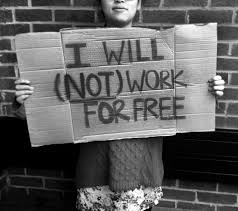In an industry where fees are kept close to everyone’s chest, it’s often hard to know what is a fair price for your time. Taking a job where I feel I have been ripped off in the fees department is never a way for me to feel like part of a team and produce my best work. I have found that it is often not a one-off. Doing one show at a discounted rate, in my experience, only leads to being offered more shows with a discounted fee attached. It is often assumed, in theatre, that the Sound Designer is at the bottom of the pile when the money is being handed out. Add to that the global phenomenon of women being paid less than men. Yes, women working full-time still often earn less than men doing the same job:
Women are Still Paid Less than Men Even in the Same Job
Nursing Pay Gap Women Paid Less
Research Finds Women Paid Less than Men in 90 Sectors
It can feel the struggle to find out if you are getting paid what you are worth. I have said this before but, I have found that, for me, working for free has never led to a paid gig. I’m not saying it doesn’t happen, but not in my personal experience.
There are Guidelines for Theatre Designers, but not specifically for Sound:
The Association of Lighting Designers has a suggested fees document that covers everything from a major musical (£20,000) to a fringe/pub theatre production (£1,000). I find that the only way not to drive myself mad is to try to stick to this. If there are special circumstances, like a very short run in hope of a transfer, then I will make sure there are clauses like: I get the first refusal if the show transfers, and that transfer will come with a fee that is the going rate. I also make sure the copyright of the sound design and content created stays with me.
If I have to be away from home, there is the issue of accommodation. £500 seems to be a standard figure offered for accommodation and travel but I am very honest if I can’t find anywhere for that and/or there are last-minute changes to schedules. Not being able to book ahead makes everything a whole lot more expensive.
Also, I always mention any dates I am not available for during the rehearsal and production period. We aren’t expected to be there for every day of rehearsals unless specified in the contract and compensated, but it is still good to give a heads-up to the director and producer of any clashes in my schedule. Theatre Sound Design pay rates mean you often have overlapping projects; people understand this but communicate with them so there are no awkward surprises later on.
I do sometimes wonder if it’s worth trying to get an agent to do the negotiating, but the only benefit I can see is that they have more of an idea of what the going rate is. I would still have to agree, or not, to the terms of the contract. Technical Design Agents in the UK theatre scene don’t really get you to work, at least not actively. As far as I’m aware, they negotiate the contract on your behalf. I have heard a variety of things from Lighting Designers: those whose rate tripled when they got an agent, to the agent who insisted on taking a cut from all of their clients’ earnings, regardless of whether they had been working as a designer or not.
The only way through, for me, is to make sure I don’t go into a job feeling that I’ve been taken advantage of. If I can manage that, then I am happy to negotiate the contract myself. And there is always the rest of the creative team who, if they won’t actually tell you the fee they are on, will tell you if they think yours is below the going rate.
